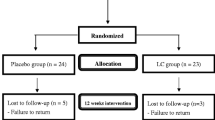Abstract
Oxidative stress conditions associated with atherosclerosis leads to oxidative modification of low-density lipoprotein (LDL). The body’s capabilities to inhibit LDL oxidation and to remove or neutralize the atherogenic oxidized LDL (ox-LDL) are limited. When the LDL cholesterol level increases in the blood, it leads to dangerous consequences like atherosclerosis, leading to myocardial infarction. The major effect of an antioxidant in the LDL environment is to prevent the formation of ox-LDL (during atherogenesis. Strategies to reduce LDL oxidation and prevent atherogenesis can involve the enrichment of arterial cells with potent antioxidants that can prevent oxidative damage to the arterial wall. The objective of this study is to evaluate the effect of l-arginine on serum lipid and cholesterol levels in the patients of acute myocardial infarction (AMI). The study consisted of 70 AMI patients and 60 healthy individuals (serving as control) age 55–65 years. Serum levels of total cholesterol, high density lipoprotein (HDL), LDL and Triglycerides were determined on day 1 and day 15 of l-arginine administration (oral dose 3 g/day). The total cholesterol/HDL and the LDL/HDL ratio were calculated and compared. As per the observations, l-arginine administration was found to improve the lipid profile of the subjects. Hence it could be used as an adjuvant therapy for AMI and as a preventive measure for the onset of the disease in the healthy elderly also.
Similar content being viewed by others
References
Houterman S, Verchuren WMM, Hofman A, Witteman JCM. Serum cholesterol is a risk factor for myocardial infarction in elderly men and women: the Rotterdam Study. J Intern Med. 1999;246:25–33.
Verschuren WMM, Jacobs DR, Bloemberg BPM, et al. Serum total cholesterol and long term coronary heart disease mortality in different cultures. Twenty five year follow-up of the seven countries study. JAMA. 1995;274:131–6.
Neaton JD, Blackburn H, Jacobs D, et al. Serum cholesterol level and mortality findings for men screened in the Multiple Risk Factor Intervention Trial. Arch Intern Med. 1992;152:1490–500.
Gordon DJ, Probstfield JL, Garrison RJ, et al. High density lipoprotein cholesterol and cardiovascular disease. Four prospective American studies. Circulation. 1989;79:8–15.
Witztum JL, Steinberg D. Role of oxidized low density lipoprotein in atherogenesis. J Clin Investig. 1991;88:1785–92.
Steinberg D. Low density lipoprotein oxidation and its pathobiological significance. J Biol Chem. 1997;272:20963–6.
Tripathi P, Misra MK. Oral administration of l-arginine in patients with angina or following myocardial infarction may be protective by increasing plasma superoxide dismutase and total thiols with reduction in serum cholesterol and xanthine oxidase. Oxid Med Cell Longev. 2009;2(4):1–7.
Tripathi P, Chandra M, Misra MK. Therapeutic role of l-arginine on free radical scavenging system in ischemic heart diseases. Indian J Biochem Biophys. 2009;46:498–502.
Tripathi P, Singh TP, Chandra M, Misra MK. l-arginine is effective in scavenging oxygen derived free radicals in the patients of ischemic heart diseases. Int J Biol Med Res. 2010;1(3):15–9.
Fried R, Merrell WC. The arginine solution. New York: Warner books; 1999. p. 67–74.
Adams MR, Jessup W, Hailstones D, Celermajer DS. l-arginine reduces human monocyte adhesion to vascular endothelium and endothelial expression of cell adhesion molecules. Circulation. 1997;95:662–8.
Bhakuni P, Chandra M, Misra MK. Oxidative stress parameters in erythrocytes of post reperfused patients with myocardial infarction. J Enzym Inhib Med Chem. 2005;20:377–81.
Bhakuni P, Chandra M, Misra MK. Effect of ascorbic acid supplementation on certain oxidative stress parameters in the postreperfusion patients of myocardial infarction. Mol Cell Biochem. 2006;290:153–8.
Shiono N, Rao V, Weisel RD, Kawasaki M. l-arginine protects human heart cells from low-volume anoxia and reoxygenation. Am J Physiol. 2002;282(3):H805–15.
Tousoulis D, Davies GJ, Tentolouris C, et al. Vasomotor effect of l and d-arginine in stenotic atheromatous coronary plaque. Heart. 2001;86:296–301.
Engleman DT, Watanabe M, Maulik N, et al. l-arginine reduces endothelial inflammation and myocardial stunning during ischemia/reperfusion. Ann Thorac Surg. 1995;60:1275–81.
Rossitch E Jr, Alexander E III, Black PMcL, Cooke JP. l-arginine normalizes endothelial function in cerebral vessels from hypercholesterolemic rabbits. J Clin Investig. 1991;87(4):1295–9.
Ryzenhov VE, Schanygina KI, Chistyakova AM, et al. Action of arginine on the lipid and lipoprotein content in blood serum of animals. Voprosy Meditsinskoi Khimi. 1984;30(6):76–80.
Cooke JP, Singer AH, Tsao P, et al. Antiatherogenic effects of l-arginine in the hypercholesterolemic rabbit. J Clin Investig. 1992;90:1168–72.
Theilmeier G, Chan JR, Zalpur S, Anderson B, Wang B. Adhesiveness of mononuclear cells in hypercholesterolemic humans is normalized by dietary l-arginine. Arterioscler Thromb Vasc Biol. 1997;17:3557–64.
Author information
Authors and Affiliations
Corresponding author
Rights and permissions
About this article
Cite this article
Tripathi, P., Misra, M.K. & Pandey, S. Role of l-Arginine on Dyslipidemic Conditions of Acute Myocardial Infarction Patients. Ind J Clin Biochem 27, 296–299 (2012). https://doi.org/10.1007/s12291-012-0188-9
Received:
Accepted:
Published:
Issue Date:
DOI: https://doi.org/10.1007/s12291-012-0188-9




